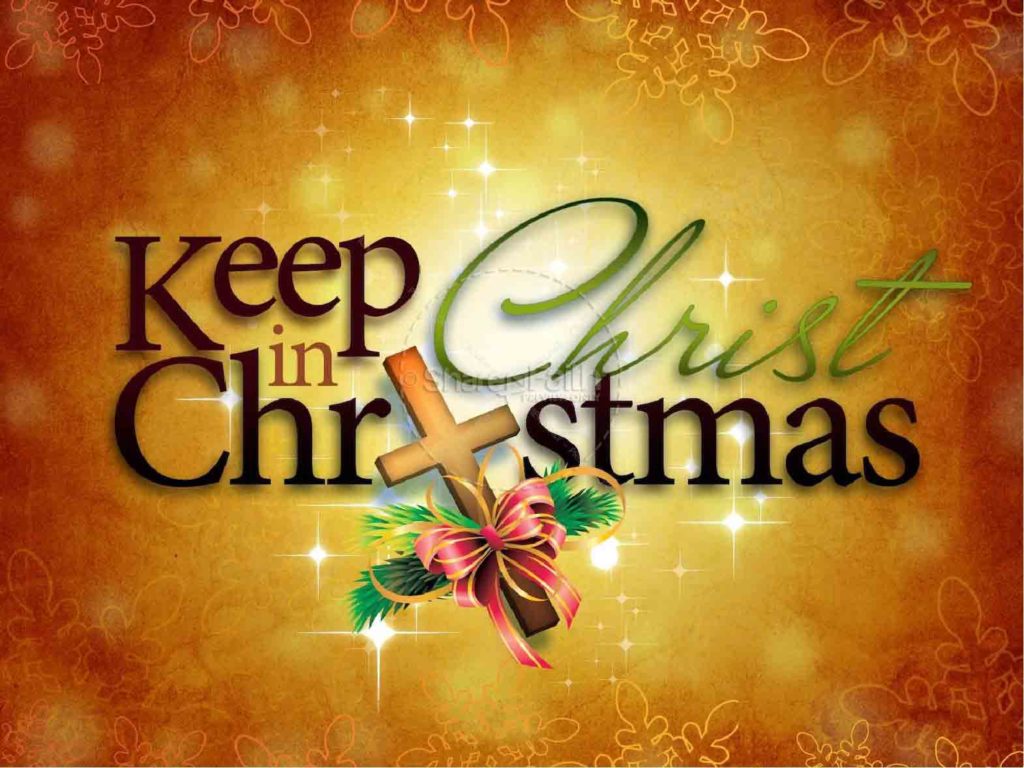Christmas used to be the most wonderful time of the year when the biggest population of the planet was happiest, when grandmas, moms and daughters cooked the old recipes. We got to decorate the Christmas tree and see the sweetest smiles of our kids when they open their gifts and share Christmas joy and blessings with neighbors. When we wore that red-and-green sweater, received more hugs and kisses from perfect strangers. Sadly, commercialization has slowly removed Christ from Christmas.

Today, it still appears to be the most delightful time of the year, if we judge by the colorful externals, fanciful lights and sounds of the season, listening to the lyrics, “O Holy Night… It is the night of our dear Savior’s birth,” composed by Adolphe Adam in 1847 and sung by Josh Groban or Andrea Bocelli.
But sometimes, one wonders whether Christmas is still best celebrated in our hearts, when we finally decide to be renewed, giving, and forgiving like Jesus.
Sometimes one wonders if children today are taught that, although Jesus is the omnipotent God who can scan the heights of the heavens and the width of the universe, he assumed our weak human nature. That He was the Word (Logos) that created the world, yet, He, too, cooed, baby-talked, rolled and crawled as any other infant. That He was the Messiah prophesied in the Old Testament, the King of the kings and the Lord of lords (Is. 7:14, Mt. 1:23, Rev. l9:16), but, then again, He, just like you and me, sucked on His mother’s breasts for milk.
I quote here from memory an excerpt of the Christmas poem by Francis Thompson, narrating the story of how a little child approached the baby Jesus in the manger.
Dear Jesus (asked the child),
Was thou shy once and just as small as I
And how did thou feel like to be just like me?
I should think that thou didst cry.
Was thy home all made of sky?
Dost thy mother kiss thee in the night
And hold thee tight?
Dost thou say thy prayer in the night,
How does it feel to be small
And walk and whisper and crawl?
No one with keen interest in human history can ignore the birth of Christianity, that introduced Christmas and its joy to humankind. In the general story of humankind, prior to any theological discourse or rationalization of faith and prior to any kind of debate, chronological history (years, months, weeks, days) was just following its natural course: Evolution, prehistory, beginning of recorded history with the invention of writing systems, and the advent of the contemporary written history.
Prehistory ended around 3000 BCE or A.C.N. in Egypt. That is the common consideration among historians, although the chronology of prehistory varies according to civilized recording. The BCE that you see is the acronym for “Before the Common Era,” followed by CE or “Current Era.” The BCE and CE you find in history books are alternatives to the Gregorian Calendar’s BC and AD (Anno Domini) usage, but it’s exactly the same.
So, what is the point of reference of “prehistory ended around 3000 BCE in Egypt”? It is Anno Domini, AD, or the Year of the Lord. The 0dyssey of humankind went on and on, cruising its normal course until such time, such “favorable time,” when the Eternal Word, the Logos – according to Christian tradition – entered human history, became one of us, “and dwelt among us” (John 1:14). That real event in history is the Year of the Lord,” Anno Domini.
“God becoming Man” or the Incarnation of the Song of God is a historical event with a fixed time and place, when Herod I was ruler of Judaea, with protagonists and villains. Christianity introduced an explanation, that this single event changed human history in a most dramatic fashion, taking into heart that this Christ-Event is not a legend or a myth.
In fact, far from being legendary or mythical, this EVENT is the most recorded and documented, its spoken narratives abundantly retold, its written chronicles the copiously translated, and its manuscripts in numerous hundred languages the most archived and secured to the max.
Human history is chronological or sequential, measured by days and weeks, year after year, century after century. However, history is also kairological. The Greek word Kairos means “time of opportunity,” a beautiful occasion, God’s time, in His time. Well, the First Christmas was God’s wonderful time. It is this Christ-Event that upgrades human history into Salvation History, with the latter merging with human history 2,000 years ago with the First Coming of the Savior and A.D. or Anno Domini as the point of reference.
God is transcendent. By transcendence, we mean the One who cannot be approached or beyond perception, and independent of the universe. Now, the transcendent God entered human history. That’s the start of Christmas.
Jesus is therefore the epiphany of the invisible Triune God and, at the same time, the epiphany of man, the earthly homo sapiens, where epiphany means “a perfect manifestation of” God and man. For good reason, Pope Francis addressed the Italian Academy of Church History and invited them to continue to contemplate “Jesus Christ as the cornerstone,” who entered human history and works in it.
The Holy Father said that Jesus “so deeply marked and redeemed human history” that the chronology of history is defined by His birth and the undeniable landmark of human history is the acronym AD (Anno Domini or the Year of the Lord). Let us bring Christ back to Christmas.
BLESSED CHRISTMAS TO ALL!
Multi-awarded writer and educator Jose Mario Bautista Maximiano is the author of the book The Beginning and The End: A Theology of the Human Person (Claretian, 2016).

